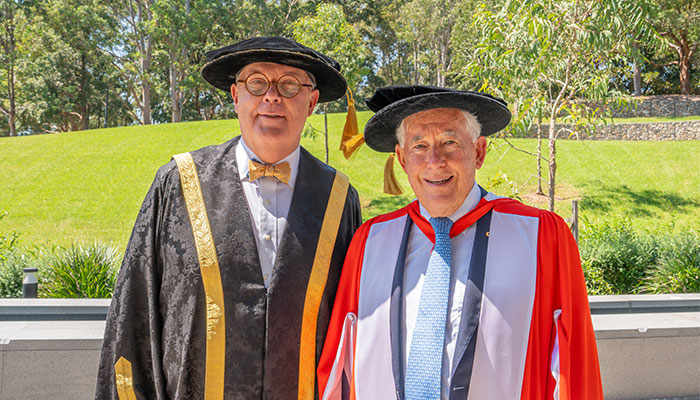A study led by Macquarie University researchers has found that climate change is affecting how quickly bird eggs develop and hatch; meaning warmer temperatures, particularly increasing frequencies of heat waves, may spell trouble for our feathered friends.
The study looked at the effect of warmer temperatures on the embryonic development of zebra finches – a small and resilient Australian native species of bird – and found that hotter weather caused their eggs to start developing even before the parents had a chance to incubate them themselves.
“We found that warmer temperatures actually led to more difficulties for the parents to ensure that all the eggs in their nest hatched at the same time, with the eggs that were laid early in the sequence hatching before those that were laid later,” explained Professor Simon Griffith, lead author of the study.
“Typically, zebra finches will lay one egg a day for about five days, and will only start to incubate their eggs on the day that the last egg is laid. This way, all the eggs incubate and hatch at the same time in the nest, making it easier for the parents to feed and look after the chicks evenly.”
The issue, the researchers say, lies with the fact that climate change is leading to heat waves becoming more frequent during the time that the birds breed, leaving these birds vulnerable.
“In the summer, we found that nests can get very hot, with recorded temperatures of up to 50◦C. These birds usually like to incubate their eggs in temperatures between 36-40◦C, and there is evidence suggesting that prolonged temperatures of over 40.5◦C can be lethal to the developing chick embryos.
“If global temperatures were to increase, it could play havoc with the family dynamic of these birds, creating situations where a single nest contains chicks of different ages, and even causing some embryos to die if the temperatures remain too hot for a long period,” Professor Griffith said.
The researchers point out that the warmer conditions may have both benefits and costs to the parents of the eggs. While the higher temperatures mean they might save time and energy on incubating the eggs themselves, they may also lose some of their younger and less developed chicks, due to the fact that they don’t preferentially feed the smallest chicks. Whether these birds can quickly adapt to the challenges of a changing climate remains to be seen, say the authors.
“Future work will need to look at whether these birds, and other birds in general, are capable of adjusting to the alterations caused by climate change, particularly in the face of increasing average global temperatures and incidences of heat waves,” Professor Griffith concluded.
Griffith, Simon C; Mainwaring, Mark C; Sorato, Enrico; Beckmann, Christa. High atmospheric temperatures and ‘ambient incubation’ drive embryonic development and lead to earlier hatching in a passerine bird. Royal Society Open Science. February 2016.
The study looked at the effect of warmer temperatures on the embryonic development of zebra finches – a small and resilient Australian native species of bird – and found that hotter weather caused their eggs to start developing even before the parents had a chance to incubate them themselves.
“We found that warmer temperatures actually led to more difficulties for the parents to ensure that all the eggs in their nest hatched at the same time, with the eggs that were laid early in the sequence hatching before those that were laid later,” explained Professor Simon Griffith, lead author of the study.
“Typically, zebra finches will lay one egg a day for about five days, and will only start to incubate their eggs on the day that the last egg is laid. This way, all the eggs incubate and hatch at the same time in the nest, making it easier for the parents to feed and look after the chicks evenly.”
The issue, the researchers say, lies with the fact that climate change is leading to heat waves becoming more frequent during the time that the birds breed, leaving these birds vulnerable.
“In the summer, we found that nests can get very hot, with recorded temperatures of up to 50◦C. These birds usually like to incubate their eggs in temperatures between 36-40◦C, and there is evidence suggesting that prolonged temperatures of over 40.5◦C can be lethal to the developing chick embryos.
“If global temperatures were to increase, it could play havoc with the family dynamic of these birds, creating situations where a single nest contains chicks of different ages, and even causing some embryos to die if the temperatures remain too hot for a long period,” Professor Griffith said.
The researchers point out that the warmer conditions may have both benefits and costs to the parents of the eggs. While the higher temperatures mean they might save time and energy on incubating the eggs themselves, they may also lose some of their younger and less developed chicks, due to the fact that they don’t preferentially feed the smallest chicks. Whether these birds can quickly adapt to the challenges of a changing climate remains to be seen, say the authors.
“Future work will need to look at whether these birds, and other birds in general, are capable of adjusting to the alterations caused by climate change, particularly in the face of increasing average global temperatures and incidences of heat waves,” Professor Griffith concluded.
Griffith, Simon C; Mainwaring, Mark C; Sorato, Enrico; Beckmann, Christa. High atmospheric temperatures and ‘ambient incubation’ drive embryonic development and lead to earlier hatching in a passerine bird. Royal Society Open Science. February 2016.



